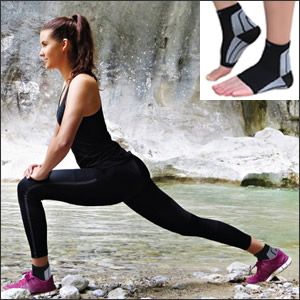FREE SHIPPING within Contiguous USA On Orders Over $49.

Plantar Fasciitis, aka Policeman's Heel, is the swelling of the tissue that runs across the bottom side of your foot and connects the bone of your heel to your toes. It is the most common cause of pain in the heel. People, like police officers, that on their feet for extended periods of time are at risk of developing this condition, hence the nickname Policeman's Heel. But did you know, Plantar Fasciitis is common in runners? If you are a runner or have a job or hobby that keeps you on your feet, here's what you need to know about Plantar Fasciitis.
Plantar Fasciitis refers to a certain kind of inflammation and swelling that can occur in the band of soft tissue on the bottom of your foot that connects your heel bone to your toes. Plantar Fasciitis can cause stabbing pain as you wake up in the morning and take your first steps. Often the pain subsides as you walk around, but it can come back again after extended periods of standing or as you simply rise to your feet after sitting for a bit.
Pain. Simply put, the signs and symptoms of Plantar Fasciitis is pain. Pain when you first wake. Pain when you get up after sitting. Pain when you have been standing on your feet for a long time. Pain when you are running or have finished running. Pain when you are exercising. And important to note, the pain associated with Plantar Fasciitis is typically worse and more noticeable after exercise and exertion, not during.
Risk factors for Plantar Fasciitis include:
Plantar Fasciitis cannot be cured with medication, though pain medications can provide temporary relief. Options to treat Plantar Fasciitis include:
As with any medical condition, you should regularly see your doctor and follow your doctor’s orders. Take your Plantar Fasciitis condition seriously, don’t just cope with it or ignore it. The pain will remind you that it is still with you. Rest and exercise, and if you have to be on your feet, wear compression foot sleeves for muscle support, improved blood flow, and comfort.
National Library of Medicine - Plantar Fasciitis
Mayo Foundation for Medical Education and Research - Plantar Fasciitis
WebMD - What is Plantar Fasciitis?